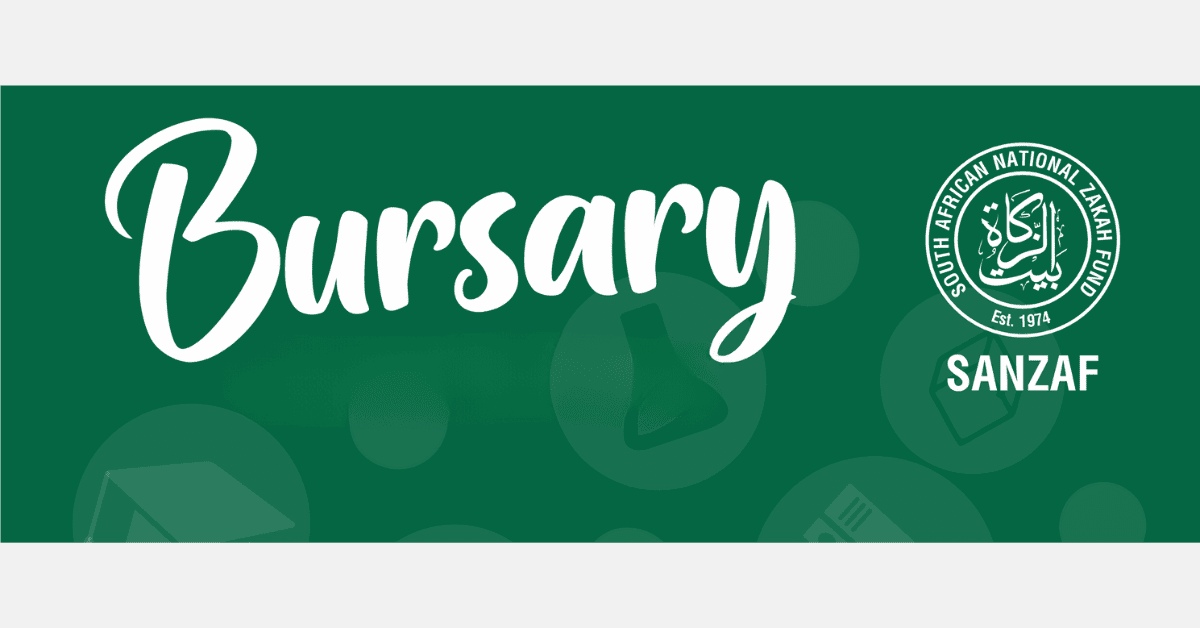The South African National Zakáh Fund (SANZAF) has been a beacon of hope and empowerment within South Africa since its establishment in 1974. As a faith-based, educational, and socio-welfare organisation, SANZAF is dedicated to uplifting communities by collecting and distributing Zakáh and Sadaqát, which align with Islamic principles. One of its flagship initiatives is the SANZAF Zakah Bursary Programme, which aims to provide financial assistance to deserving students pursuing tertiary education.
Understanding the SANZAF Zakah Bursary
The SANZAF Zakah Bursary is designed to support students from financially disadvantaged backgrounds, enabling them to access higher education opportunities that might otherwise be out of reach. By alleviating the financial burden associated with tertiary studies, SANZAF empowers students to focus on their academic pursuits and contribute positively to society.
Fields of Study
One notable aspect of the SANZAF Zakah Bursary is its inclusivity regarding fields of study. The bursary is open to students across all disciplines, reflecting SANZAF’s commitment to fostering a diverse and educated community. Students pursuing studies in engineering, medicine, humanities, or any other field are eligible to apply for this bursary.
Eligibility Criteria
To be considered for the SANZAF Zakah Bursary, applicants must meet the following criteria:
- Citizenship: Applicants must be South African or foreign nationals with valid study permits.
- Residency: Applicants should reside in the province where they apply for the bursary.
- Financial Need: Demonstrable financial need is a crucial criterion. Applicants must provide proof of financial constraints, indicating that they cannot fund their tertiary education independently.
- Educational Status: The bursary is available to:
- Current matriculants.
- Students who have completed matriculation.
- Students currently enrolled in a tertiary institution.
- Previous Sponsorship: Applicants must fall into one of the following categories:
- Sponsored by a family member or themselves in the previous year.
- Previously sponsored by SANZAF.
- Institutional Enrollment: Applicants must be enrolled or intend to enrol at a recognised University, University of Technology, or Technikon in South Africa.
It’s important to note that meeting these criteria does not guarantee bursary funding, as selection is at the sole discretion of SANZAF. Preference is given to applicants with exceptional academic performance or those experiencing severe financial need.
Application Process
The application process for the SANZAF Zakah Bursary is straightforward and region-specific. Prospective applicants should follow these steps:
- Identify Your Region: SANZAF operates across various regions in South Africa, each with its own application process. Applicants should apply to the region in which they reside.
- Access the Application Form: Visit the SANZAF official website and navigate to the bursary section. Select the appropriate regional link to access the application form.
- Complete the Application Form: Fill out the application form with accurate and complete information. Ensure that all sections are thoroughly addressed.
- Prepare Supporting Documents: Gather all necessary supporting documents, which may include:
- Certified copy of ID or study permit.
- Proof of registration or acceptance at a tertiary institution.
- Latest academic transcripts or matric certificate.
- Testimonial from your school or religious leader.
- Proof of household income (e.g., payslips, affidavits).
- Motivational letter explaining the need for financial assistance.
- Submit the Application: Ensure that the completed application form and all supporting documents are submitted before the specified closing date for your region.
Key Dates and Application Deadlines
Application deadlines vary by region. As of the latest information available, the closing dates are as follows:
- Western Cape: 31 December 2024.
- Gauteng: 10 January 2025.
- East London: 15 January 2025.
- Ladysmith: 25 January 2025.
- Pietermaritzburg: 15 January 2025.
- Kimberley: 31 January 2025.
Applicants are advised to verify these dates on the SANZAF official website or contact their regional offices, as deadlines are subject to change.
Selection Process
Once applications are submitted, the SANZAF Bursary Committee reviews and shortlists potential candidates. Shortlisted applicants are invited for interviews, with details communicated via email. It’s imperative for applicants to be available on the specified interview dates and to provide all required documentation promptly.
Successful candidates receive a Confirmation of Pledge letter outlining the bursary terms. All bursary payments are made directly to the educational institution on behalf of the student. Applicants are responsible for securing their own registration fees, as SANZAF does not cover these costs.
Impact of the SANZAF Zakah Bursary
The SANZAF Zakah Bursary has profoundly impacted the lives of many students across South Africa. By providing financial assistance, SANZAF enables students to pursue their academic goals without the overwhelming burden of tuition fees and related expenses. This support facilitates personal growth and contributes to developing skilled professionals who can positively influence their communities.
Conclusion
The SANZAF Zakah Bursary Programme embodies the spirit of compassion and community upliftment inherent in Islamic teachings. By offering financial support to deserving students, SANZAF plays a pivotal role in shaping a brighter future for individuals and society at large. Prospective applicants are encouraged to review the eligibility criteria carefully, adhere to application guidelines, and submit their applications within the stipulated deadlines to

